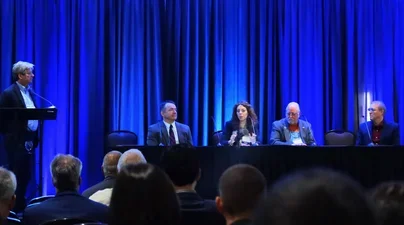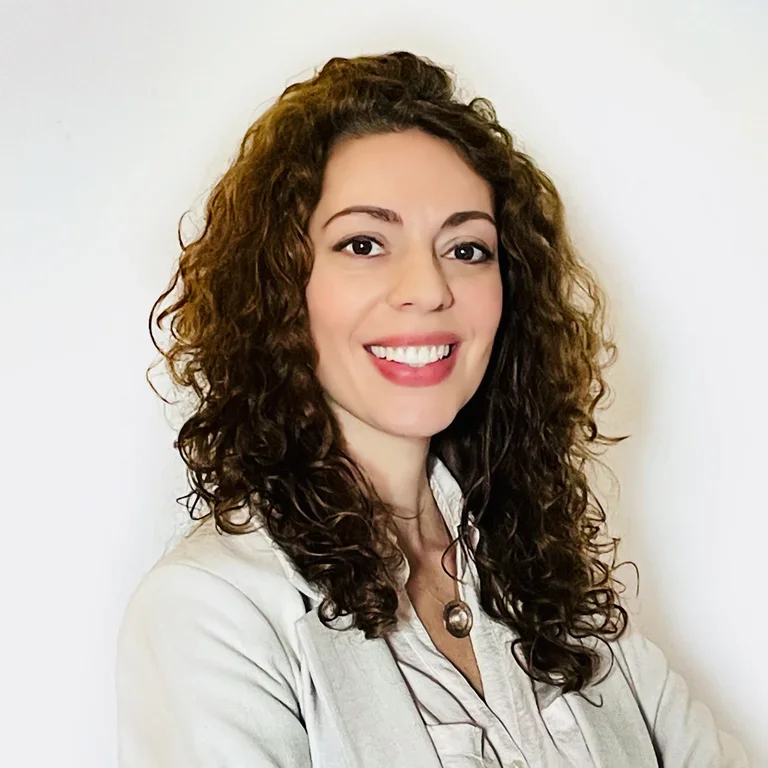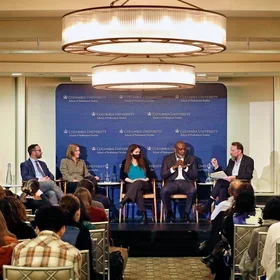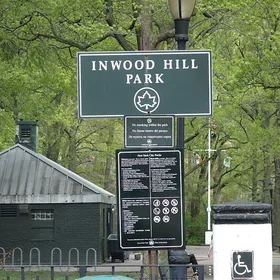By Evangelia Ieronymaki, Ph.D., P.E., Senior Lecturer in the M.S. in Construction Administration, School of Professional Studies
As an academic and a professional civil engineer, I bring extensive experience in geotechnical engineering research and practice. I had the privilege to showcase this experience at this year’s Geo-Structures conference, organized by the Geo-Institute of the American Society of Civil Engineers (ASCE), where I served as editor of the proceedings, keynote speaker, panelist, and paper presenter.
Bringing together experts in geotechnical engineering, the event explored advancements in the design, analysis, and construction of earth-retaining systems. Additionally, I had the honor of being interviewed by the Geo-Institute of ASCE, where I shared insights about my background, my role within Columbia SPS’s Construction Administration program, and the significance of my contributions at the event.
Insights from Geo-Structures 2024: Advancing Earth-Retaining Practices
Geo-Structures 2024, held November 17–20, 2024, in Pittsburgh, brought together leading professionals and academics to discuss advancements in earth-retaining systems. Organized by the Earth Retaining Structures, Geosynthetics, and Underground Construction technical committees, this event is part of a prestigious series of conferences held every 20 years since 1970. Geo-Structures 2024 provided a unique platform for practitioners, researchers, constructors, owners, and suppliers to exchange insights, explore innovations, and address the challenges of designing, analyzing, and constructing earth-retaining systems using the latest technologies and sustainable practices.
This year’s event highlighted the diverse and evolving landscape of geotechnical engineering. Attendees explored the latest developments in cantilever walls, MSE walls, soil nail walls, bridge abutments, dock walls, and other earth-retaining systems. The conference’s 59 rigorously peer-reviewed technical papers, six keynote presentations, and five specialty panels underscored the importance of bridging research and practice. By fostering collaboration among professionals, the event reaffirmed the geotechnical community’s commitment to advancing sustainable construction practices and innovative engineering solutions.
I had the privilege of contributing to this outstanding event in several capacities. As the editor of the conference proceedings, I collaborated with a talented team to ensure the publication adhered to ASCE’s stringent guidelines, producing a volume that will serve as a valuable resource for years to come.
In my keynote presentation, “Synthesis of Practice for Deformation Criteria for SOE Wall Systems,” I addressed a pressing issue in the field: the lack of consistent guidance on acceptable deformation limits for support of excavation (SOE) wall systems. Current design standards often focus on strength and stability, leaving deformation criteria vague and outdated. The collaborative research with Dr. Antonio Marinucci that I presented synthesizes methodologies, case studies, and existing guidelines to propose a practical framework for determining acceptable wall deflection limits. The framework offers contractors and project owners data-driven recommendations to establish realistic performance expectations.

Dr. Evangelia Ieronymaki, senior lecturer in the M.S. in Construction Administration program, speaks at the Geo-Structures 2024 conference.
Additionally, I participated as a panelist in a discussion on deflections of earth retaining systems (ERS). This panel provided a platform to engage with other experts, share perspectives, and explore solutions to complex problems. My technical paper presentation further delved into the behavior and implications of diaphragm walls in various ground conditions, complementing the discussions and enhancing the conference’s technical content.
Beyond the technical sessions, the conference fostered a warm, collaborative environment that enhanced productive and friendly communication among all participants. The organizing committee played a key role in this success, ensuring every detail contributed to creating a welcoming space for meaningful exchanges.
A memorable highlight for me was an interview conducted by the director of the Geo-Institute of ASCE. The conversation touched on my professional journey, my research, my role at Columbia SPS, and broader insights into technological advancements in everyday life. The inclusion of personal and general topics made the interview both relaxing and fun, adding a refreshing touch to the event.
The aftermath of GeoStructures 2024 has left a lasting impression on everyone involved. It was a specialty conference to remember for years—a perfect blend of intellectual rigor, collaborative spirit, and genuine enjoyment. It stands as a testament to the power of connection and innovation in shaping the future of geotechnical engineering.
Reflections and Connections to Columbia SPS
Participating in Geo-Structures 2024 reinforced the importance of aligning academic research with industry needs, a core principle of Columbia SPS’s Construction Administration program. The conference highlighted how innovative research can address real-world challenges, preparing future professionals to lead in the construction field. This experience inspires me to continue fostering collaboration and equipping my students with actionable insights to tackle complex engineering problems in construction.
About the Program
Columbia’s Master of Science in Construction Administration program prepares graduates for a variety of careers at the forefront of construction and project leadership. Graduates develop rewarding careers with some of the world’s most respected architecture, engineering, and construction firms, entrusted with delivering some of the most impactful projects of our time.



